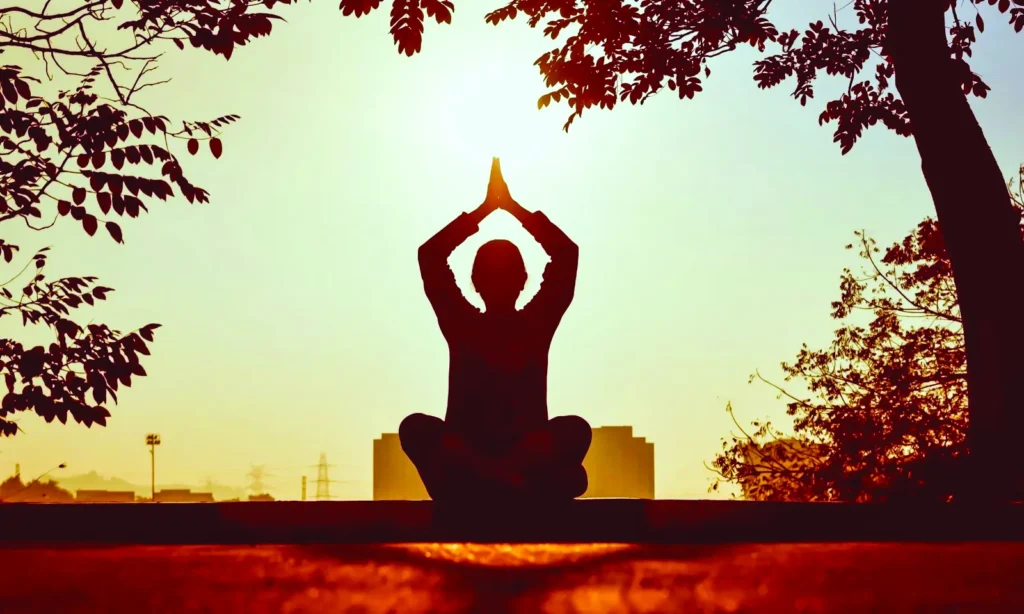In today’s fast-paced world, where stress, anxiety, and mental health issues are becoming increasingly common, meditation has emerged as one of the most effective ways to cope with these challenges. Meditation is not just a practice; it is a powerful tool for achieving a balanced life, promoting physical health, and enhancing mental well-being. This article explores the significance of meditation, its benefits, and how it can be integrated into daily life to lead a healthier, more fulfilling life.
What is Meditation?
Meditation is an ancient practice that involves focusing the mind, often through controlled breathing, mindfulness, or visualizations, to achieve a mentally clear and emotionally calm state. It is a technique that has been practiced for thousands of years, originating in ancient cultures such as India, China, and Egypt. Meditation is a tool for personal transformation and self-awareness, which helps individuals attain a sense of peace, balance, and inner strength.

The practice of meditation can vary significantly depending on the tradition, but the essence remains the same – to quiet the mind and connect with one’s inner self. Whether through mindfulness, mantra repetition, or visualization, meditation creates an environment where the individual can focus their energy on the present moment, letting go of distractions and anxieties.
The Benefits of Meditation
The benefits of meditation are vast and wide-ranging, affecting the body, mind, and spirit. Some of the key benefits include:
1. Reduces Stress and Anxiety
One of the most well-known benefits of meditation is its ability to reduce stress and anxiety. Meditation encourages relaxation by activating the parasympathetic nervous system, which counters the body’s stress response. By focusing on the breath or a calming visualization, the mind is able to detach from external stressors, creating a sense of calm and tranquility. Regular meditation can help individuals better manage the pressures of daily life, leading to a more relaxed and peaceful existence.
2. Improves Mental Clarity and Focus
Meditation enhances concentration and mental clarity. By training the mind to focus on a single object, thought, or sensation, meditation increases one’s ability to focus in everyday life. This heightened focus helps improve memory, decision-making, and cognitive abilities. Many people who practice meditation report that they feel more mentally clear and able to tackle tasks with greater efficiency and creativity.
3. Enhances Emotional Health
Meditation has been shown to have a profound impact on emotional health. Regular practice helps individuals develop a greater sense of self-awareness, emotional regulation, and empathy. By observing their thoughts and emotions without judgment, individuals can cultivate a more positive outlook on life. Meditation helps individuals develop emotional resilience, making it easier to cope with difficult emotions such as sadness, anger, or fear.
4. Promotes Physical Health
Meditation also has numerous physical health benefits. It can help lower blood pressure, reduce the risk of heart disease, and improve sleep quality. Studies have shown that people who meditate regularly tend to have a lower heart rate and better cardiovascular health. Meditation also boosts the immune system, making the body more resistant to illness. Additionally, it helps regulate the body’s stress hormones, such as cortisol, which can otherwise have negative effects on the body when they remain elevated for prolonged periods.
5. Increases Self-Awareness
Meditation encourages individuals to look inward and develop a deeper understanding of their thoughts, behaviors, and patterns. This increased self-awareness is a powerful tool for personal growth and self-improvement. By becoming more aware of their mental and emotional states, individuals can better manage their reactions, make conscious choices, and lead more intentional lives.
6. Promotes Better Sleep
Meditation has been found to improve sleep quality and help individuals fall asleep more easily. The relaxation that meditation induces helps calm the mind and prepares the body for rest. For those who struggle with insomnia or other sleep-related issues, meditation can be a natural, effective remedy. It promotes deep, restorative sleep, ensuring that the body and mind get the rest they need to function at their best.
Meditation and Its Role in the Modern World
In the modern world, where people are often caught up in the rush of daily life, meditation serves as a sanctuary. With constant distractions from technology, work, and personal responsibilities, the need for mindfulness and mental clarity has never been greater. Meditation provides a way for individuals to disconnect from the noise of the world and reconnect with their inner selves.
The practice of meditation has gained significant popularity in recent years, with many individuals turning to it as a way to improve their overall quality of life. It is no longer confined to spiritual or religious practices but has been embraced as a secular practice for well-being. Meditation is now commonly integrated into therapy sessions, fitness routines, and corporate wellness programs. This shift in perception has made meditation more accessible and acceptable to people from all walks of life.
Meditation and International Awareness
In an effort to raise global awareness about the importance of meditation and its benefits, the United Nations has declared December 21st as International Meditation Day. This day serves as a reminder to individuals worldwide to take a moment for self-reflection, mindfulness, and inner peace. The initiative aims to spread the message of mental well-being and highlight the role of meditation in promoting global peace and harmony.
International Meditation Day encourages people to recognize the importance of mental health in addition to physical health. In a world where mental health issues such as anxiety, depression, and stress are on the rise, meditation provides an accessible and effective solution for individuals to manage their well-being. The growing recognition of meditation’s positive impact on mental health is a step toward creating a more compassionate, balanced, and peaceful world.
How to Begin Your Meditation Practice
Starting a meditation practice is simple and requires only a few basic steps. Here’s a guide to help you begin:
Find a Quiet Space: Choose a quiet place where you won’t be disturbed. It could be a corner of your room, a park, or any space that makes you feel comfortable and relaxed.
Sit Comfortably: You don’t need to sit in any particular posture, but it’s important to sit comfortably. You can sit cross-legged on the floor, on a cushion, or in a chair with your feet flat on the ground.
Focus on Your Breath: Close your eyes and focus on your breathing. Inhale deeply through your nose, hold for a moment, and then exhale slowly. If your mind starts to wander, gently bring your attention back to your breath.
Use a Mantra or Visualization: Some people find it helpful to repeat a mantra or visualize a peaceful scene. This can help deepen the meditation experience and maintain focus.
Start with Short Sessions: Begin with short sessions, around 5 to 10 minutes, and gradually increase the time as you become more comfortable with the practice.
Be Consistent: Consistency is key to experiencing the benefits of meditation. Try to meditate daily, even if it’s just for a few minutes, to build the habit and see long-term benefits.
Conclusion
Meditation is not just a practice; it is a way of life that promotes holistic well-being. By incorporating meditation into daily life, individuals can experience profound benefits, including reduced stress, enhanced mental clarity, emotional stability, and improved physical health. As the world becomes increasingly aware of the importance of mental health, meditation stands out as a timeless and invaluable tool for fostering peace, both within ourselves and in the world at large.
International Meditation Day is a reminder of the power of meditation to transform lives and promote global wellness. Whether you are new to meditation or have been practicing for years, it is never too late to start your journey toward a healthier, more peaceful life. Take a moment each day to practice mindfulness, and you will find that the benefits extend far beyond the meditation session itself, enriching every aspect of your life.














